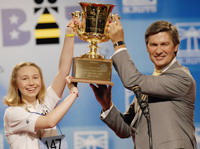It is not easy to find competitive words for spelling bee
"Cortege" is not so often positively used after the death of Princess Diana, nowadays applied only to funeral processions.

These days, its a softball word for the best of the 286 spellers gathering in the U.S.'s capital for the 80th annual Scripps National Spelling Bee. The competition begins Wednesday and culminates with a prime-time Thursday night finish on ABC.
The young competitors have spent months poring over word lists and dictionaries, probing the depths of entomology in an attempt to answer one nagging question: What strange word is Carolyn Andrews going to come up with next?
"It is tricky," said Andrews, who has the daunting task of finding competitive words for the spelling bee. "What's easy for one person might be difficult for another. That is the hardest part of developing the word list."
"Cortege" is one example of a word that simply lost its degree of difficulty when used in everyday vocabulary, she said.
Andrews, whose son won the bee in 1994, has been the word list manager since 1998, leading a three-person panel that spends the year looking for words in likely - and unlikely - places. One year she added "cloisonne" (an enamel process used to make jewelry) after spotting it in a mail order catalog.
In a perfect world, all of the words in each round would be equally difficult to spell. No one wants to hear that collective audience groan that says: "Oh, that's an easy one."
"There is no objective way to evaluate the difficulty level of words," said Paige Kimble, the spelling bee's director. "There are words that people are exposed to more frequently because of where they live or because of their culture or because of their age."
Last year's winner, Katharine Close, 14, of Asbury Park, New Jersey, said she did not know some of the words that knocked out her competitors.
"It's just a matter of luck that I didn't get those, and I got words that I did know how to spell," she said.
Two years ago, Samir Patel was not happy when he finished second after missing the word "Roscian" while his opponent correctly spelled "appoggiatura."
Appoggiatura (a type of musical note) looks a lot uglier in print, but Roscian - with its capital letter - is one of those dreaded proper adjectives, words based on names that do not always follow the usual rules of structure that help the best spellers piece together the letters.
"A lot of times the difficulty is just a matter of opinion," said Samir, 13, of Colleyville, Texas. He is competing for the fifth time this year and is considered one of the favorites to win the title.
The spellers have plenty of resources to give them a head start. The bee's Web site has a Consolidated Word List of 23,413 words from previous bees, and Andrews writes a 36-week course of study aids called "Carolyn's Corner."
But the one and only complete source for study is the unabridged Webster's Third New International Dictionary - and it contains more than 470,000 entries.
"We don't advocate memorizing lists," Andrews said. "We want them to learn how words are put together. We want them to learn prefixes, suffixes and combining forms, and spelling patterns of the various languages."
There comes a point, however, when the bee has to separate the elite from the rest of the pack. The spellers know that as the competition nears the end, more and more words come out of left field, words like "weltschmerz" (a type of mental depression), which stymied the runner-up last year.
"Obviously, the competition can't go on forever," Andrews said. "That's how you get a champion - by making the words more difficult."
Subscribe to Pravda.Ru Telegram channel, Facebook, RSS!

